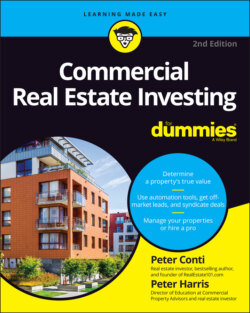Читать книгу Commercial Real Estate Investing For Dummies - Peter Harris - Страница 65
Leases: As the lease goes, so goes the value
ОглавлениеA lease is a written legal agreement between the lessor (the landlord) and the lessee (the tenant) whereby the lessee compensates the lessor (by paying rent) for the use of the property for a specific time period. There’s no such thing as a typical commercial lease, but here are a few main differences between a lease for a commercial property and a residential property (an apartment unit, for example):
A commercial lease is a lot tougher to get out of than a residential lease.
A commercial lease tends to last a lot longer, sometimes for 20 years.
Because no standard commercial lease exists, parties can be as flexible and creative as they want.
A commercial lease has significantly less consumer protection (for the tenant) than a residential lease does. Many tenant/landlord laws such as rent control don't apply.
When you buy a commercial property, you’re buying the leases, and the property comes for free. That’s how important the actual lease is to the value of the property. Simply put, if the lease is weak, your property value is weak. And conversely, if the property has a strong lease, the property value is going to be strong.
As you may imagine, leases are the number-one killer of deals. They’re the lifelines of income to the property. If the lifeline is tethered and weak, then your income is weak as well. And who wants to invest big dollars in a not-so-sure income stream? The lender won’t, and you shouldn’t either. In fact, if a business in one of the shopping center’s stores has a lease agreement with one year left, the income from that store isn’t even counted by the lender when making a loan decision — maybe you shouldn’t count it in your initial analysis either.
Here’s how you, the investor, or a lender would look at a property’s lease in connection to the value it creates for the property: Say you’ve been sent a great deal from your broker. It’s for a 5,000-square-foot, single-tenant property that’s occupied by the successful family-run and family-owned Grandma’s Corner Groceries. The rent is $7 per square foot, or $35,000 per year and that includes taxes, insurance, and maintenance. The current lease has five years remaining.
Say also that you’ve been sent another deal for a 5,000-square-foot property that has a Starbucks as its tenant. Starbucks pays $6 per square foot, or $30,000 per year, which also includes taxes, insurance, and maintenance. The current lease has five years remaining.
The question is this: Which is the better investment? Grandma’s Corner Groceries or Starbucks? Which one is a lower risk? Which one allows you to predict that you’ll be paid every month for the next five years? Which one is less likely to go out of business? Which one will enable you to sleep at night knowing that your investment dollars are in good hands?
Starbucks is the obvious answer, even though you have higher income on the grocery store. Starbucks is a highly rated company and is publicly traded on the NASDAQ. Its financials are open to the public. It has a responsibility to its shareholders to make a profit. Even if it decides to close up shop there and abandon the property, it must make good on the lease and pay the lease off in its entirety. On the other hand, Grandma’s Corner Groceries is backed by who knows what. Grandpa? If it goes out of business for some reason — fire, theft, infighting, divorce — your options for financial recourse don’t favor your breaking even. So, the property with the Starbucks lease will command a greater value because of its lower risk.
Here are a handful of things to watch for when reviewing a lease agreement as an investor:
Rent amount
Lease term or how long the lease is for
Additional costs that the landlord and tenant may be responsible for
Subleasing
Whether you need to do any improvements to the property before you move tenants in
Is it a gross lease where the landlord pays expenses or a net lease with the tenant paying their share of the expenses?
Read the leases thoroughly many times so that you don’t miss a thing. If you don’t believe us, check out this example about our friends who missed a very important clause in the lease: They purchased a shopping center and the largest tenant, which took up one-third of the total space, had a clause in the lease that said if the store didn’t produce $600,000 in gross sales per year, it could back out of the lease. Two years into the lease, the sales volume dropped below $600,000, and the tenant opted out of the lease.
